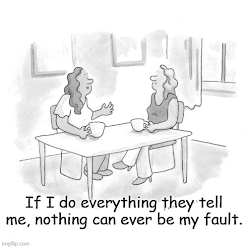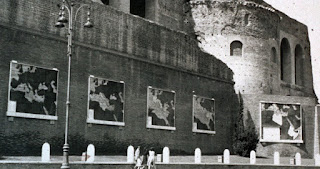 On July 25, 1943, the leader of the Italian government, Benito Mussolini, was arrested on orders from the King of Italy. That day, my grandfather was on vacation with his family on the hills. Coming back home by train, he walked out of the station without having read the newspapers of the day, so he was still wearing his Fascist party badge. Someone told him that it was not a good idea, but he refused to take it off and, for a few days, he stubbornly insisted on wearing it. It took several days before he was forced to realize that the days of Fascism were over.
On July 25, 1943, the leader of the Italian government, Benito Mussolini, was arrested on orders from the King of Italy. That day, my grandfather was on vacation with his family on the hills. Coming back home by train, he walked out of the station without having read the newspapers of the day, so he was still wearing his Fascist party badge. Someone told him that it was not a good idea, but he refused to take it off and, for a few days, he stubbornly insisted on wearing it. It took several days before he was forced to realize that the days of Fascism were over. I am telling you this story to show you that Fascism in Italy was not something imposed by jack-booted thugs wearing black shirts. My grandfather, surely, was not one: I remember him as a kind man who loved children. But, during its heydays, Fascism was a truly totalitarian phenomenon. It permeated every facet of life: at school, at work, in the family, everything. And it was diffuse in all social classes: from the nobility to the workers. But what was it, exactly? An idea? A political party? A person? A hallucination? Or what?
Fascists saluted each other by outstretching their right hands in the "Roman Salute," which the Ancient Romans never used. They would recognize the "fascio" as a symbol of unity, a meaning that it probably never had in Roman times. They claimed to have rebuilt the Roman Empire by conquering a country, Ethiopia, that newer was part of the ancient Roman Empire. They shared with each other some typical ideas, such as nationalism, racism, the idea of self-sacrifice ("me ne frego,") and a love for uniforms and military parades. In terms of policies, Fascism was a mix of socialism, nationalism, paternalism, imperialism, and more, often in contradiction with each other. It could be anything, but, in practice, it was mainly one thing: Benito Mussolini himself, the Duce degli Italiani, the absolute ruler of Italy.
During the Fascism age, the propaganda machine of the Fascist party ran unopposed and saturated the Italians' worldview. The power of the Duce grew so much that it probably went beyond the expectations of his sponsors, and perhaps of Mussolini himself. It became a common slogan that "Mussolini ha sempre ragione" (Mussolini is always right), and he would bask in public ceremonies where he was revered by "oceanic crowds". The Italian people had completely delegated to him all powers. They had regressed to the role of children obeying the orders of their stern father. Mark Oshinkie correctly described this phenomenon as follows (not referred to Italian Fascism, but valid for it, too),
Overall, per Jean Piaget, they thought like eight-year-olds. And as did Cub Scouts, they exhibited a pack mentality: the dysfunctional kind.
This image (author unknown) nicely summarizes the essence of Fascism, just as of all forms of totalitarianism:
How could it happen that so much power was bestowed on a single man? In part, Mussolini's success was due to sheer luck, but also to his capability to bluff, and his willingness of catching a good opportunity when it appeared. More than all, he was a master of propaganda, one of the first politicians in history to use the new mass media -- the press, movies, and the radio -- for self-promotion. As a politician, Mussolini knew even too well that all politics is based on finding someone to blame. And he was selling to his sponsor the idea to deflect the rage of the working class to foreign targets, away from the Italian elites. Pivoting on a series of myths that were already diffuse at that time, he blamed the troubles of Italy on the decadent Northern Plutocracies, the evil Soviet Communists, and the inferior African races. In this way, he managed to obtain support from those sectors of Italian society which had been fighting each other before Fascism: the workers, the financial sector, the industrial sector, the military, the intellectuals, and the King of Italy himself.
But Mussolini was not just a politician. He was a great salesman, too, one of those people who don't just sell things, they sell dreams. He sold to Italians the dream of a new Roman Empire and that they, the descendants of the ancient Romans, would be the new masters of the world. And Italians bought that dream enthusiastically. For 20 years, Italy saw a wave of Roman symbols, banners, fascis, people dressed in togas, and speeches about the new Empire. If you visit Rome today, you can still see four maps of the expansion of the Roman Empire on the wall of the ancient Forum, placed there in 1934. A fifth map, now removed, depicted the modern Italian conquest of Libya and Ethiopia. Was it a political program? If it was, it failed miserably. But at the time, evidently, it looked like a good idea.
For some 20 years, the Duce was Italy, and Italy was the Duce. You could say that he was playing the mythical role of the "Sacred King," concentrating on himself the glory and the responsibility for all that was happening, good and bad. And everything that happened was written in the Celestial Gantt Charts, up in the sky. Glory is a harsh mistress, and no man can keep his mind sane for a long time while staying at the top, surrounded only by adulators and sycophants. By the late 1930s, Mussolini had become a caricature of himself: his mask of strong-jawed man had devoured him, turning him into a bumbling fool who had lost contact with reality, and who threw Italy into a series of absurd wars that ended with a humiliating defeat. Mussolini played the role of the sacred king up to the end, when, in 1945, he was ritually sacrificed, atoning with his death the atrocities committed in his name.
I think that Simon Sheridan has a key observation, here. In examining the Covid story, he interprets it in terms of the "devouring mother" -- an archetype that goes in parallel with that of the sacred king, but that's different in many ways. From Sheridan's site:
Drawing on the work of the great Swiss psychologist, Carl Jung, Sheridan makes the case that the archetype that has been dominant in the west for several decades is The Devouring Mother, a shadow form whose primary qualities include gaslighting, emotional manipulation and guilt tripping all in the name of protecting her children. Sheridan switches between the microcosmic and the macrocosmic to show how The Devouring Mother permeates all levels of society from interpersonal relationships and employment through to large scale political and social movements including corona.So, the West may have experienced an "archetype switch" during the second half of the 20th century, when propaganda moved from promoting the rule of dominating fathers (or sacred kings) to that of devouring mothers, also known as "castrating mothers." Sheridan's idea makes a lot of sense. When the corona pandemic appeared, no strong leader emerged with the promise of bombing the evil virus to submission. On the contrary, the strong man of 2020, Donald Trump, was positively damaged by his attitude that many perceived as callous and uncaring. At most, we saw the emergence of suave grandfatherly figures, such as Tony Fauci, who adopted gaslighting as his main communication tool. And "Science" took the role of the devouring mother.
There is a logic in this archetype switch. A sacred king is a real person, while the devouring mother is an abstraction. From the viewpoint of the elites, an abstract archetype is much better. "Science" can be easily controlled by corrupting those who speak for it, the scientists. Instead, a great leader can hardly be corrupted: he has all the power, and so he can have everything he wants. Another advantage of having raised science to a god-like role is that if (when) things start going bad, politicians and officials can reasonably hope to be able to get off the hook (in a literal sense), by blaming the scientists for having misled them. Mussolini was hanged upside down, but you cannot hang science. That does not prevent the possibility that individual scientists will be hanged, just like the Nazis at Nuremberg. But the elites don't care about scientists.
In the end, it is the human mind that creates myths, gods, and monsters. It is keeps them alive, and gives them the power to harm people. Propaganda is just an amplifier of these powers -- evil is all in the mind of the believer. You have to resist this evil, and you can if you remember that reality is not what appears in TV or in the media. Reality is what you see and what you touch. It is your friends, your family, your partner, your children. It is the ground you touch, the flowers you see, the singing of birds. Just stay human, and Fascism will never return.









